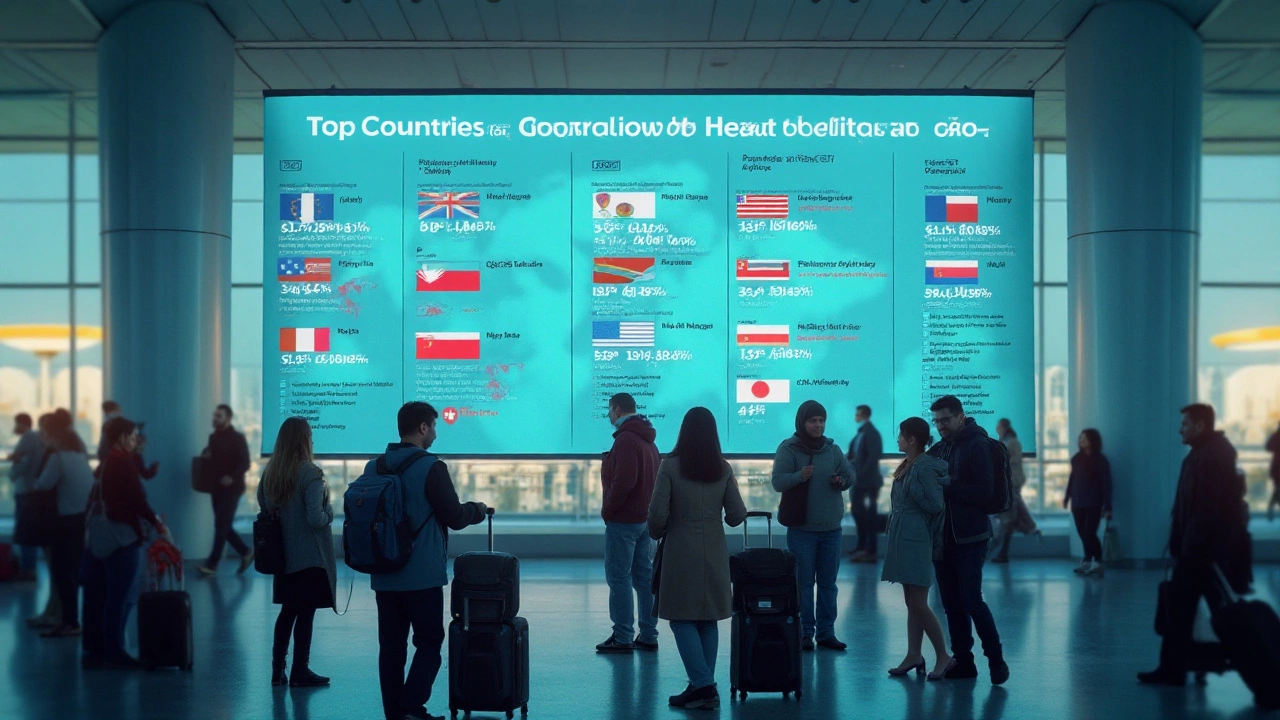When it comes to sick leave, not all countries offer the same benefits, and this can have a big impact on people's choices when searching for work abroad or contemplating relocation. Sick leave policies are crucial as they ensure employees can take time to recover without the added stress of financial worries.
From shorter recovery times to extensive rehabilitation periods, nations around the world have crafted diverse policies to cater to their workforce's health needs. Understanding these variations can offer insights into which countries value the well-being of their workers and how this can influence choices for medical tourism destinations.
- Understanding Sick Leave Policies
- Top Countries with Generous Sick Pay
- Impact on Medical Tourism
- Economic and Social Implications
- Choosing the Right Destination
Understanding Sick Leave Policies
Sick leave policies are a fundamental part of employment law and labor rights in many countries, crafted to safeguard the healthcare and well-being of employees. While they may vary greatly from one nation to another, the principle behind them is universal: to provide workers with the time they need to recover from illnesses or injuries without the added pressure of financial strain. These policies aren't just about taking a day off when you're unwell; they're a reflection of a country's commitment to a healthy, productive workforce. Employees need this time to ensure their own health doesn't deteriorate due to untreated conditions exacerbated by work stress.
There's a fascinating diversity when it comes to how these policies are structured globally. For instance, in Germany, employees are entitled to up to six weeks of full pay when they fall ill, a policy supported by statutory health insurance. Such generous sick pay policies highlight a country's intent to prioritize employee well-being and are also a significant factor in attracting international talent and medical tourism. By contrast, the United States offers no federal legal requirement for paid sick leave, leaving it to individual states or employers to determine the specifics. This leads to a patchwork of policies that can be confusing and unevenly distributed across the workforce.
Understanding these nuances is crucial for anyone considering working or receiving medical treatment abroad. Sick leave policies can influence not only the decision of where to pursue employment but also where to travel for medical reasons. It's important to consider both the duration and the economic support provided during such leaves. As an example, a study revealed that European countries fare better in providing paid leave compared to their global counterparts, which often corresponds to better overall health outcomes. This correlation underscores why these policies are a key consideration for medical tourism seekers looking for both care and security in their leave benefits.
"Sick leave is not simply an employee perk. It is a public health imperative, and more countries need to adopt more generous policies," notes Dr. Hans Kluge, a reputable member of the World Health Organization.
For potential expatriates or medical tourists, weighing these options can sometimes be overwhelming. Employee benefits like sick leave play a vital role in making informed decisions. Some countries have recently reformed their policies to provide unpaid alongside paid sick leave, aiming to provide a safety net even in situations where income might not be guaranteed. Ultimately, these policies reflect the broader values of a society regarding health and workforce productivity. They send a clear message about how much countries value the health and productivity of their employees and residents. Therefore, understanding sick leave policies is not merely about compliance or rights; it is about grasping how much a society chooses to invest in human health and well-being.
Top Countries with Generous Sick Pay
When exploring the world map of sick leave benefits, it becomes evident that certain countries stand out with their exceptionally generous healthcare policies. At the forefront is Sweden, where employers are required to offer sick pay to employees for the first 14 days. After this period, the government steps in, providing coverage up to 80% of the salary for an extended duration. Such comprehensive policies have made Sweden a sought-after destination for those prioritizing work-life balance and well-being.
Across the North Sea, Norway offers similar benefits. In Norway, employees are entitled to receive sick leave benefits for up to a year, paid at full salary for the first 16 days by the employer. Thereafter, the government's social security system covers the costs, ensuring financial stability during times of illness. This robust support system reflects Norway’s commitment to its citizens' health and has earned the country a spot as a top consideration for medical tourism.
Impact of Generous Sick Pay
These comprehensive healthcare policies are not merely perks but essential constituents of a country’s employment landscape. In Germany, for instance, employees enjoy a statutory right to six weeks of full salary sick leave financed by their employer, after which health insurance typically covers partial salary for up to 72 weeks, which underscores the significance of health security in Europe’s largest economy. As such, nations like Germany, Sweden, and Norway not only attract the locals but also present a lucrative prospect for expatriates seeking a secure health safety net. This attraction often spills over into the field of medical tourism, drawing individuals to these countries not just for their acute care facilities but for the whole gamut of healthcare benefits that these sick leave policies encapsulate.
“A robust sick leave policy doesn't just protect workers; it embodies a society's commitment to public health and economic resilience.” - Paul Farmer
Japan offers a unique model where sickness benefits integrate with its national health insurance system. Patients can expect two-thirds of their salary during extended leaves caused by illness, illustrating a delicate balance between employer and government responsibilities. Meanwhile, in Austria, employees receive full pay for up to 12 weeks, which can extend to up to 30 weeks based on tenure and type of illness. Such systems not only protect the workforce but also relieve some burdens on the healthcare system by diminishing workplace infections. In such climates, employees feel secure to take adequate time off, fostering an ethos of trust and responsibility.
The importance of employee benefits extends beyond mere financial support; it significantly impacts the psychological well-being of the workforce. Knowing that their financial needs will be met even while they heal, reduces stress and, consequently, promotes faster recovery. In the global race to offer top-notch benefits, countries with generous sick leave provisions are shaping up to be not just pleasant workplaces but also prime destinations for medical tourism enthusiasts, eager to explore a comprehensive approach to healthcare during their travels.

Impact on Medical Tourism
The concept of medical tourism has become a noteworthy trend in the global healthcare system. With people frequently seeking medical treatments, recuperation, or surgeries abroad, the sick leave policies of a nation can significantly influence their decision. Some countries, known for their liberal and worker-friendly sick leave policies, naturally become appealing destinations for those who value not just medical care but restful recovery. Some travelers are attracted to these countries because they can extend their recuperation period without job-related worries.
Countries such as Sweden and Germany, famous for their extensive sick leave benefits, often see patients from countries where medical costs are exorbitant or sick leave is limited. These generous medical leave policies don't just aid residents but also make it easier for foreigners to plan their treatment and recovery phase. Moreover, this aspect of a country's healthcare policy plays a pivotal role in patient satisfaction, meaning that positive experiences can lead to more international recommendations and an influx of medical tourists.
The economic impact of medical tourism is large, benefiting healthcare providers, accommodation and hospitality sectors, and even local businesses. When people travel for medical reasons, they typically invest in extended stays, leisure activities, and other services. Consequently, understanding a country's sick leave policies in conjunction with their healthcare services can reveal a lot about how the medical tourism aspect may flourish or dwindle.
"Medical tourism is not merely about seeking care abroad but also about the holistic experience of recuperation and healing, which is profoundly influenced by a nation's sick leave policies." — Dr. Anthony Khoury, Healthcare Analyst.
An aspect that is sometimes overlooked is the educational impact on local practitioners who gain exposure to diverse medical issues and can learn from international colleagues who visit. This exchange of knowledge can lead to improved facilities and better care standards, making the destination more attractive for future medical tourists. Thus, sick leave policies intertwined with medical infrastructure and expertise create a potent mix that can significantly alter a nation's medical tourism prospects.
By prioritizing employee health and ensuring a low financial impact during illness, these policies indirectly fortify a country's allure as a medical tourism hub. It's a compelling play where healthcare infrastructure, generous leave arrangements, and patient-centric practices come together to craft a favorable environment for foreign nationals seeking both first-rate medical care and financial prudence. Countries willing to extend a helping hand through sick day allowances may just find themselves becoming key players in the medical tourism industry.
Economic and Social Implications
The sick leave policies have profound effects on the economy and social fabric of a nation. Generous sick leave can be a double-edged sword, providing employees with much-needed respite while often leading to increased financial burdens on taxpayers and businesses. Countries like Germany and Sweden, which are known for their robust sick pay systems, have intricately balanced these aspects to maintain workforce productivity. Sick leave not only offers financial security but also enhances overall employee health, reducing long-term healthcare costs for both government and individuals. A healthy workforce is invariably more productive, contributing to a stable economy and thriving industries.
On the other hand, there are nations that struggle with the costs associated with extensive sick leave systems. Employers in such countries might face higher labor costs, which could potentially affect profit margins and competitiveness in various sectors. To mitigate this, some countries have introduced insurance schemes or government-funded compensation programs to distribute the financial load. A strategic approach to sick leave can stimulate job satisfaction and loyalty, ultimately benefiting employers with a dedicated workforce, reducing turnover, and limiting financial loss triggered by absenteeism.
The social implications of sick leave are equally significant. Such policies highlight a country's commitment to human rights, exemplifying how it values its citizens' health and well-being. These provisions are often seen as indicators of a compassionate society that prioritizes life quality. This perception can have broader implications, influencing everything from national morale to immigration patterns. When a country supports its workforce by investing in their health, it invariably attracts talent and can stand out on the global stage as a desirable place to live and work.
"Ensuring the health of our workforce is not just a moral obligation, but an economic imperative," states the World Health Organization, drawing attention to the integral relationship between health policies and economic stability.
From another perspective, robust sick leave policies may deter some international businesses from entering markets where labor costs are deemed prohibitive. However, for companies that can adapt and thrive within such frameworks, these policies often lead to a more engaged, content, and efficient workforce, capable of driving innovation and maintaining high quality standards in global markets.
In conclusion, while the exact economic and social impacts can vary, the overarching trend is clear: well-structured sick leave policies have the power to transform both the economy and society positively. As countries continue to navigate these waters, understanding the nuances and trade-offs becomes essential, particularly for those involved in medical tourism, where such policies could directly influence the choice of destination for both workers and businesses alike.

Choosing the Right Destination
Selecting the perfect country for experiencing a generous sick leave policy can be a maze, especially when policies differ significantly across borders. Factors like the duration of paid leave, ease of access to healthcare facilities, and broader employee benefits play a crucial role in making this decision. In countries like Germany and Sweden, employees enjoy not just ample sick leave but also access to top-tier healthcare services. There's a peace of mind in knowing your employment and health are both secure.
Medical tourism adds another layer to this decision-making process. For those seeking medical treatment abroad, a nation's healthcare policy, including the employee benefits, can provide insights into the quality of its healthcare system. Opportunely, countries with robust sick pay policies often reflect a larger commitment to healthcare quality, making them attractive destinations not just for potential long-term residents, but also for travelers needing medical care. When considering the prospective destinations, it is also wise to look into whether the country provides support for family members during medical treatments, as this can be a deciding factor for many.
Social and cultural factors can also shape one's preference. Nations with strong community support systems can often help augment the state-provided benefits, creating a strong safety net. Scandinavian countries have set a benchmark where public support and state policy go hand in hand to create a harmonious environment for someone healing from illness. This sort of integration piques the interests of those planning not just to visit, but to perhaps stay for the long haul.
For the economically minded, the ripple effects of a generous sick leave policy can signal a developed understanding of work-life balance and employee welfare. Productivity and overall job satisfaction are often higher in nations where workers feel well-supported during times of illness. Countries like Japan, although not offering the longest sick leaves, have efficient healthcare systems that provide swift medical interventions, ensuring that sick days are effective and recovery is quick. This balance can be attractive to those looking at both healthcare and employment stability.
"A strong healthcare framework not only supports individuals but builds a resilient society. Nations investing in employee health reflect a commitment to sustainable growth." - World Health Organization
In your quest for selecting the right destination, remember that the healthcare policies are just one aspect of a more nuanced system of living that includes local culture, public services, and economic stability. Balancing these factors can help you make a more informed choice. So, when striking out to explore possibilities, consider how each nation's distinct sick leave policies might align with your personal health needs and career goals. By doing so, you not only make a choice for better healthcare but also a choice for a better living experience.
